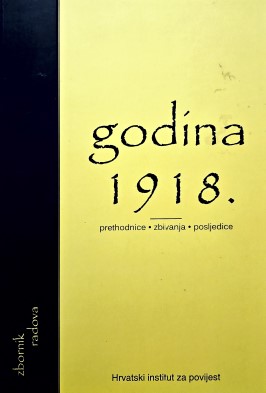Savez Hrvatsko-srpske koalicije i bana Ivana Skerlecza u upravljanju Hrvatskom u vrijeme Prvoga svjetskog rata – značaj i posljedice
The Alliance between the Croat-Serb Coalition and Ban Ivan Skerlecz in administering Croatia during the First World War – Its meaning and consequences
Author(s): Ivan BULIĆ
Subject(s): Diplomatic history, Military history, Political history, Government/Political systems, Pre-WW I & WW I (1900 -1919), Peace and Conflict Studies
Published by: Hrvatski institut za povijest
Keywords: Austro-Hungarian Monarchy; Ban Croatia; Croatian-Serbian coalition; Ban Skerlecz; Kingdom of Serbia;
Summary/Abstract: At the end of the First World War an attempt was made to put into effect political projects which had been defined in an earlier time period. The 1913 parliamentary elections signified an end to previously irreconcilable political notions of solving the Croatian question which resulted in a suspension of constitutionality, the introduction of a commissariat, and assassinations. A change in policy toward Croatia was expressed through two actions: an agreement with the Croat-Serb Coalition and the nomination of Ivan Skerlecz as commissar. Upon becoming Ban (governor), the prospect of an agreement with the Coalition provided him with a significant influence on the government. The politics of the Croat-Serb Coalition during the First World War can be viewed on various levels. Accepting the terms of an agreement with the Hungarian government ensured it of a political position, which in the end enabled it with a mandate in constitutional discussions. The conditions surrounding Skerlecz’s administration of Croatia can be evaluated against internal and external political factors which placed him and the Coalition in the midst of key processes during the First World War.
Book: Godina 1918. Prethodnice, zbivanja, posljedice
- Page Range: 23-47
- Page Count: 25
- Publication Year: 2010
- Language: Croatian
- Content File-PDF

